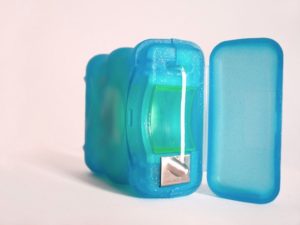Birmingham Dentist
 It is not uncommon for many of us to grab a bite to eat in a hurry. Americans have grown accustomed to bigger food portions at restaurants, but our mouths have not. Trying to fit that oversized sandwich or apple in your mouth might be worse for you than you have ever imagined. Below are some reasons why this could be detrimental for your oral health and what you can do about it.
It is not uncommon for many of us to grab a bite to eat in a hurry. Americans have grown accustomed to bigger food portions at restaurants, but our mouths have not. Trying to fit that oversized sandwich or apple in your mouth might be worse for you than you have ever imagined. Below are some reasons why this could be detrimental for your oral health and what you can do about it.
Why This Is a Problem
According to the Academy of General Dentistry (AGD), taking bites that are too big for you to chew can not only cause jaw and teeth issues, it can also cause digestive problems. Discomfort, swelling and difficulty eating may result from opening your jaw too wide. Taking large bites may also result in food not being chewed thoroughly, which can lead to weight gain and digestive issues.
Temporomandibular Joint Disorder (TMD)
Constantly opening your jaw too wide becomes an even larger problem for people with temporomandibular joint disorder (TMD). The temporomandibular joint connects the jaw to the skull bones enabling movement during chewing. People with TMD, usually have a restriction with how wide they can open their jaws. Taking large bites of food, especially hard foods like apples, can aggravate this condition making pain and jaw clicking worse.
What You Can Do
If you have food that is too large to chew or starts to cause jaw discomfort, try cutting your food into smaller portions. This makes food easier to eat with less hassle. Also consider eating softer foods that won’t harm your teeth or irritate your jaw.
Tip: Avoid chewing on ice, popcorn kernels, hard candies, and opening nuts with your teeth. This can lead to a chipped tooth!
Contact our team today to schedule an exam and cleaning.


 Loose teeth, bad breath, and painful, bloody gums – these are among the signs and symptoms of periodontal, or gum, disease. Unfortunately, periodontal disease can also begin without any obvious symptoms. If left undiagnosed or untreated, you could be at risk for irreparable damage to your teeth and gums. The good news is that periodontal disease is preventable. In fact, one of the most effective tools for preventing the disease only takes a minute of your time each day.
Loose teeth, bad breath, and painful, bloody gums – these are among the signs and symptoms of periodontal, or gum, disease. Unfortunately, periodontal disease can also begin without any obvious symptoms. If left undiagnosed or untreated, you could be at risk for irreparable damage to your teeth and gums. The good news is that periodontal disease is preventable. In fact, one of the most effective tools for preventing the disease only takes a minute of your time each day.




